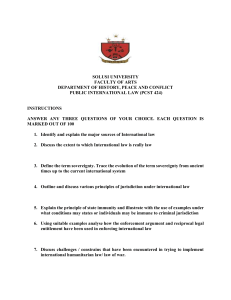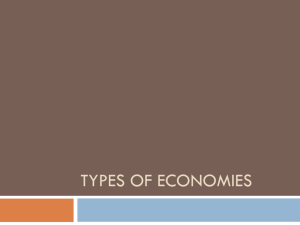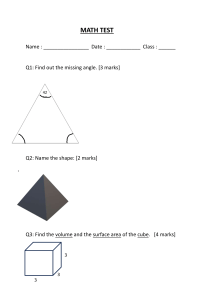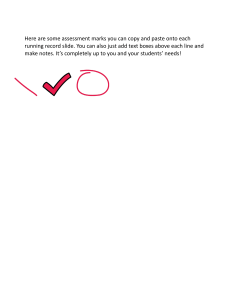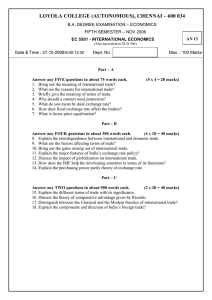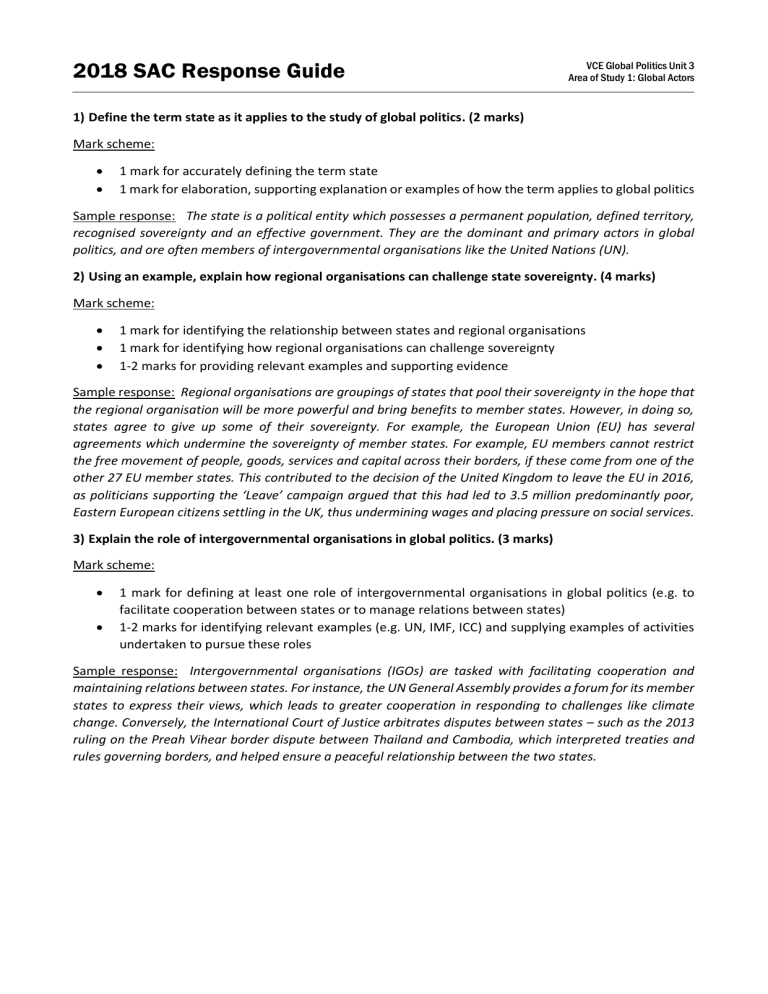
2018 SAC Response Guide VCE Global Politics Unit 3 Area of Study 1: Global Actors 1) Define the term state as it applies to the study of global politics. (2 marks) Mark scheme: 1 mark for accurately defining the term state 1 mark for elaboration, supporting explanation or examples of how the term applies to global politics Sample response: The state is a political entity which possesses a permanent population, defined territory, recognised sovereignty and an effective government. They are the dominant and primary actors in global politics, and ore often members of intergovernmental organisations like the United Nations (UN). 2) Using an example, explain how regional organisations can challenge state sovereignty. (4 marks) Mark scheme: 1 mark for identifying the relationship between states and regional organisations 1 mark for identifying how regional organisations can challenge sovereignty 1-2 marks for providing relevant examples and supporting evidence Sample response: Regional organisations are groupings of states that pool their sovereignty in the hope that the regional organisation will be more powerful and bring benefits to member states. However, in doing so, states agree to give up some of their sovereignty. For example, the European Union (EU) has several agreements which undermine the sovereignty of member states. For example, EU members cannot restrict the free movement of people, goods, services and capital across their borders, if these come from one of the other 27 EU member states. This contributed to the decision of the United Kingdom to leave the EU in 2016, as politicians supporting the ‘Leave’ campaign argued that this had led to 3.5 million predominantly poor, Eastern European citizens settling in the UK, thus undermining wages and placing pressure on social services. 3) Explain the role of intergovernmental organisations in global politics. (3 marks) Mark scheme: 1 mark for defining at least one role of intergovernmental organisations in global politics (e.g. to facilitate cooperation between states or to manage relations between states) 1-2 marks for identifying relevant examples (e.g. UN, IMF, ICC) and supplying examples of activities undertaken to pursue these roles Sample response: Intergovernmental organisations (IGOs) are tasked with facilitating cooperation and maintaining relations between states. For instance, the UN General Assembly provides a forum for its member states to express their views, which leads to greater cooperation in responding to challenges like climate change. Conversely, the International Court of Justice arbitrates disputes between states – such as the 2013 ruling on the Preah Vihear border dispute between Thailand and Cambodia, which interpreted treaties and rules governing borders, and helped ensure a peaceful relationship between the two states. 4) Using an example, explain the impact of globalisation on state sovereignty. (3 marks) Mark scheme: 1 mark for defining the term ‘globalisation’ 1 mark for linking the term globalisation to state sovereignty 1 mark for supplying a relevant, accurate example Sample response: Globalisation refers to the acceleration and intensification of exchanges of goods, services, labour and capital between states, which promotes global interdependence. This means that the more interconnected the world becomes, the less relevant and effective state borders become, thus undermining an challenging the exclusive control that a state possesses – and thus its sovereignty. For example, in 2016, Russian hackers attempted to influence the outcome of the US Presidential elections through the theft and publication of Democratic Party emails in an effort to embarrass Hillary Clinton, and through programming bots to spread pro-Trump and anti-Clinton messages on Twitter. In doing this, the Russian government was able to promote views among American voters that the Democratic party was corrupt and the election was rigged, and they may have succeeded in influencing the outcome of the election. 5) Identify one goal of the International Criminal Court (ICC). (1 mark) Mark scheme: 1 mark for clearly stating one of the goals outlined in Rome Statute of the ICC Sample response: To hold to account the perpetrators of crimes against humanity, war crimes, and genocide. 6) Evaluate to what extent the ICC is successful in achieving this goal. (4 marks) Mark scheme: examples must relate directly to the aim stated in Q5 in order to earn marks 1 mark for providing a judgment or opinion which answers the question 1-3 marks for relevant examples, accurate explanations and supporting evidence Sample response: The ICC has been generally unsuccessful in holding to account the perpetrators of the worst crimes. Since the Rome Statute entered into force in 2002, it has secured 4 convictions. For example, in 2014, former Vice President of the Democratic Republic of Congo Jean-Pierre Bemba was sentenced to 18 years imprisonment for the use of sexual violence as a weapon of war. However, other criminals have eluded justice to the unwillingness of states to cooperate with the ICC. For example, Sudanese President Omar al-Bashir has been indicted for war crimes. Despite this, al-Bashir has travelled freely without being arrested. For example, when he visited South Africa (a Rome Statute signatory) in 2015, President Jacob Zuma refused to arrest Bashir, arguing that sovereign states could interpret their obligations to the ICC however they saw fit. 7) Evaluate to what extent the International Monetary Fund (IMF) challenges the sovereignty of states. (5 marks) Mark scheme: 1 mark for providing a judgment or opinion which answers the question 1-3 marks for discussion and evidence which illustrates how the IMF can challenge state sovereignty 1-3 marks for discussion and evidence which illustrates how state sovereignty limits the power of the IMF and prevents it from challenging the state Sample response: The IMF only challenges the sovereignty of states under very specific circumstances, and because joining the IMF and accepting its conditions is optional, any loss of sovereignty is essentially voluntary. The IMF has 189 member states, who each agree to pay a subscription fee in exchange for its advice and the option of receiving emergency loans. These pooled resources give the IMF a lending capacity of $688 billion, and allow it to act as a ‘lender of last resort’ when states cannot secure loans from private banks and risk a financial crisis or sovereign debt default. However, the IMF imposes an average of 19.5 conditions on each loan it offers, requiring states to make structural changes to their economies. For example, the EU-IMF bailout loan of 100 billion Euro (2010) contained 41 conditions, requiring the Greek government to privatise government owned businesses, reduce pensions, and reduce public spending. This severely undermined Greece’s economic sovereignty, forcing it to adopt policies that were contrary to its national interest and lowered living standards. For example, unemployment increased from 11% (2010) to 26% (2015). However, while this was clearly not desirable by the Greek government, it chose to accept the terms as it considered them preferable to the alternative – defaulting on its loans, losing access to the Euro, and thus losing access to international trade and finance. This shows that while the IMF can challenge state sovereignty, the challenge is minor and accepted voluntarily by states who see IMF-imposed austerity measures as preferable to the alternative. 8) Evaluate to what extent the United Nations achieves one of its aims. (8 marks) Mark scheme: 1 mark for identifying a relevant aim of the UN and providing a judgment of how far the UN achieves this 1-4 marks for identifying the successes of the UN in pursuit of this objective 1-4 marks for identifying the failures of the UN in pursuit of this objective Sample response: The UN has is able to achieve its aim of protecting human rights and freedoms, but this is often limited by state sovereignty and the veto power of the permanent five members of the UN Security Council. The UN General Assembly helps establish and promote shared norms of human rights, such as the ‘Responsibility to Protect’ (R2P) doctrine. This holds that respect for state sovereignty is conditional on a state protecting its citizens from war crimes, crimes against humanity and genocide. If a state commits or condones these, then the UN Security Council may authorise an armed intervention. For example, after Libyan President Muammar Qaddafi used the air force to commit war crimes against civilian protestors in 2011, the UNSC passed Resolution 1973, authorising “all necessary measures” to ground the Libyan air force. A NATO intervention swiftly destroyed the Libyan air force, reducing the Gaddafi regime’s ability to commit these crimes. Similarly, after Syrian President Bashar al-Assad ordered the use of sarin gas on the city of Douma in 2013, the UNSC passed Resolution 2118 ordering the Syrian government to give up its chemical weapons in an internationally-supervised process. However, the capacity of the UNSC to punish violators of human rights is limited. Since the UN Charter argues that the UN must operate on the principle of the ‘sovereign equality of member states’, it is considered illegitimate for any intervention to take place without the UNSC’s approval. The permanent 5 members of the UNSC (Russia, China, USA, UK, France) each possess the power to veto any UNSC Resolution, and thus prevent the UN from protecting human rights. For example, when the UNSC voted on a draft resolution to refer Bashar al-Assad to the ICC for war crimes was debated, Russia vetoed it, arguing that the Assad regime had a sovereign right to use violence to overcome a rebellion. Since the beginning of the Syrian Civil War in 2011, Russia has vetoed 14 draft UNSC resolutions aimed at sanctioning the Assad regime for its human rights violations. This means that Assad can continue to commit war crimes with impunity.

